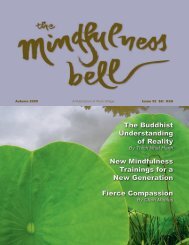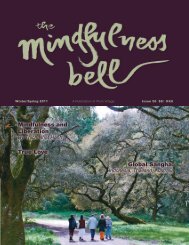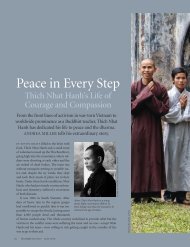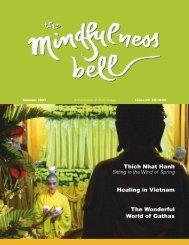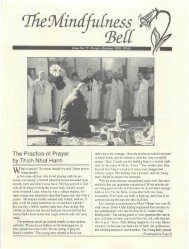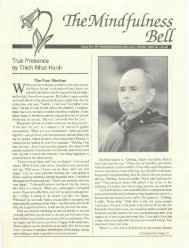Download - The Mindfulness Bell
Download - The Mindfulness Bell
Download - The Mindfulness Bell
You also want an ePaper? Increase the reach of your titles
YUMPU automatically turns print PDFs into web optimized ePapers that Google loves.
talks from VESAK<br />
factories gained other than pollution, loss of cropland and depletion<br />
of natural resources that, once lost, will never be available again<br />
A few attain material affluence, and certainly the top managers in<br />
the companies selling these goods — and their financial backers—<br />
make lots of money out of this, but for the majority, do their wages<br />
and long working hours compensate for the loss of contentment<br />
and the sense of community that grounds them Is this really how<br />
we want to see the world come full circle<br />
All this has been happening for a while, but we have not been<br />
aware of the bind we’re creating for ourselves because we are too<br />
busy wanting this, buying that. Buddhism, however, gets right<br />
into the heart of the matter because it tells us that, actually, no,<br />
the real cause of climate change is not high levels of greenhouse<br />
gas emissions, but our craving. It is because we crave all these<br />
goods and services that so much energy and resources are devoted<br />
to their production, which, in turn, lead to the release of so much<br />
greenhouse gas as well as a widening wealth gap.<br />
<br />
the tools for tackling the problem as well, in the form of the precepts<br />
and the Noble Eightfold Path. Thay’s elaboration of the five<br />
precepts is particularly useful because they are made relevant for<br />
the modern world. <strong>The</strong> Fifth <strong>Mindfulness</strong> Training is particularly<br />
relevant for the modern consumer because it reminds us to be<br />
mindful of not only what we traditionally regard as “intoxicants,”<br />
but also of what we see on TV, read in magazines, and so on. After<br />
all, advertising, whether subtle or not so subtle, is responsible to<br />
a great extent for the craving that’s causing so much difficulty<br />
for us.<br />
<strong>The</strong> environmental movement has been slow to make headway<br />
because, most of the time it is, as the saying goes, “preaching to<br />
the converted” or up against stiff resistance. It owes its success of<br />
recent years to the fact that different elements of the movement<br />
<br />
over the “I’m not a plastic bag” campaign.<br />
Skillful Buddhist Means<br />
Buddhism, on the other hand, stands a better chance of reaching<br />
people of different persuasions because, whether we know it at<br />
this moment in time or not, we all want to be happy and find meaning<br />
in life. Three Buddhist concepts are of vital importance:<br />
1. Dependent origination<br />
2. <strong>Mindfulness</strong><br />
3. Sangha<br />
We need people to understand what the concept of dependent<br />
origination means for them, in a language that everyone can understand.<br />
When I talk to architects and surveyors about sustainable<br />
building, I like to use a technical term they can relate to — ‘life<br />
cycle cost’. But really the idea is no different from that of the<br />
clouds, the sun, and the soil contributing to the growth of a beautiful<br />
flower. Bringing personal experience to bear, like the green<br />
NGOs taking people to see landfills, is even better. We need to find<br />
ways to make the ancient idea relevant to a modern audience.<br />
<strong>Mindfulness</strong>, of course, underpins our appreciation of our<br />
interdependence. So how about teaching mindfulness meditation<br />
in schools Make it as natural as learning to read and write. <strong>The</strong>re’s<br />
a reason why food companies in the U.S. are now forbidden from<br />
<br />
so powerful, adults fall for them as well, all the time. By making<br />
us aware of the root of the problem, from moment to moment,<br />
mindfulness meditation is a powerful antidote against the advertising<br />
that we don’t currently realize is responsible for causing so<br />
much craving.<br />
In his book One City 4 , Ethan Nichtern mentions a fashion<br />
magazine designer who, after taking up meditation, became more<br />
and more aware of the deeply manipulative nature of her job,<br />
and began to wonder whether it was right livelihood. That’s how<br />
meditation can help us and the world. Like the designer, some of<br />
us may be led to question whether our current work represents<br />
<br />
courage to face it will we stand a chance of coping with climate<br />
change and social inequity.<br />
Finally, we need to widen the Sangha, in the sense of a supportive<br />
community. Recent research 5 demonstrates something very<br />
interesting: many people are obese not because they eat the wrong<br />
food or do not exercise, but because their social networks consist<br />
of people who are heavier than the average. That’s how powerful<br />
<br />
do. If our friends are always shopping for designer clothes and the<br />
latest mobile phones, we do too. If our friends recycle and avoid<br />
disposable cutlery, we eventually do as well. So if we can cultivate<br />
mindfulness Sanghas, we will be able to create social networks<br />
that reinforce earth-friendly behaviour.<br />
Upaya, the Buddhist concept of “skillful means,” will need<br />
to be applied for the other three to work. Exactly what these skillful<br />
means might be is a topic for another day, but I hope we all<br />
give them serious thought and set things in motion. We only have<br />
seven years.<br />
1 Keith, David: “A surprising idea for ‘solving’ climate change”. TED.<br />
http://www.ted.com/index.php/talks/view/id/192<br />
2 Climate Change 2007: Synthesis Report <br />
indicates carbon emissions must peak by 2015 if average global<br />
temperature is not to rise beyond the manageable limit of 2.4° C.<br />
3 WWF Hong Kong: “Air Quality and Climate Change Study”, May 2007.<br />
4 Nichtern, Ethan: One City: A Declaration of Interdependence. Wisdom<br />
Publications. 2007.<br />
5 Aubrey, Allison: “Are Your Friends Making You Fat”. NPR. http://www.<br />
<br />
Angela Tam, Patient Action<br />
of the Heart, lives in Hong<br />
Kong, where she is active<br />
in women’s rights, animal<br />
welfare, environmental<br />
protection, climate change<br />
awareness, sustainable<br />
development, and heritage<br />
conservation. Author of<br />
Sustainable Building in Hong<br />
Kong, she also publishes<br />
an ezine, Sustainable Living<br />
Hong Kong.<br />
24 Winter/Spring 2009



